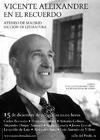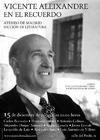作者簡介
 阿萊桑德雷
阿萊桑德雷(Vicente Pío Marcelino Cirilo Aleixandre y Merlo、1898年4月26日-1984年12月14日)西班牙詩人,1977年諾貝爾文學獎獲得者。阿萊桑德雷曾被認為是一個存在主義者,一個神秘主義泛神論者和一個新浪漫主義者。(新浪漫主義:19世紀末20世紀初在歐洲興起的一種文藝思潮)雖然阿萊桑德雷本人並未將自己視為保守的超現實主義者,但在他的詩中可以看到其受弗洛伊德主義的影響——下意識聯想和夢臆般的意象。性愛,孤獨,時間和死亡是阿萊桑德雷作品的主題 。
??
1977年獲獎演說
??“詩人,一個真正意義上的詩人,始終是一個啟示者。從本質上來說,他是預言家,是先知。然而他的預言當然不是一種關於‘未來’的預言,它可能與‘過去’相關:它是一種超越時空的預言。詩人——照明者,光的瞄手,人類的儆戒者。詩人是一顆芝麻的擁有者,從某種神秘的意義上,可以說,就是關於他自身命運的文字的擁有者。”(摘自1977年的獲獎演說)
?
人物生平
童年的家庭
??阿萊桑德雷·文森特,生於塞維亞。其父是一名土木工程師,其母是一位地方軍事指揮官的女兒。在他還是孩童時,全家遷往了馬拉加(西班牙南部一個生產葡萄的城鎮),詩人在那裡漸漸長大並隨後在自己的詩中描繪了那裡明媚如畫的景致。1909年,阿萊桑德雷一家遷往馬德里,他隨之進入了Teresiano高等學校,1913年他從那裡獲得了自己的高中文憑。第二年,詩人進入馬德里大學學習法律,1920年畢業後成為馬德里工商管理學院的助理教授。隨後他又為安達盧西亞鐵路公司工作並寫詩以自娛。
??
孤獨與病魔纏身
??1922年以後,阿萊桑德雷的健康開始出現嚴重的問題,幾年之內他變成了半殘廢。他隱退回到父親在鄉間的一所宅第,並開始全身心投入寫作。“孤獨與冥思賦予我一種洞見,一種我從未放棄的觀念:與其餘人類的團結。”由於內向孤僻加之疾病纏身,阿萊桑德雷一直秘密地寫作。直到1926年,他的第一份詩稿才由他的朋友們發表在《歐美評論》雜誌上。
??
??次年,阿萊桑德雷遷入馬德里北部郊區的一棟小別墅,他在那裡渡過了餘生。
??
嶄露頭角
??阿萊桑德雷早期的作品是在魯文·達里奧,安東尼奧·馬查多,以及烏納穆諾,希梅內斯的影響下寫就的。1928年詩人在《輪廓》(ÁMBITO)中嶄露頭腳,初次顯示了自己的風格,那是一部關於自然與愛的水晶般的詩集。在此前後,阿萊桑德雷開始閱讀西格蒙德·弗洛伊德的作品,在詩集《大地之戀》(PASIÓN DE LA TIERRA 1935)中其對詩人的影響可見一斑。裡面的詩歌被有意識地安排成一系列次序,它們欲要探究一個所有真實之物都碎裂其中的世界。《毀滅或愛情》(LA DESTRUCTIÓN O EL AMOR 1935)關注性愛與死亡,它堪稱阿萊桑德雷詩歌作品中的傑作,也是整個20世紀西班牙詩歌中最具影響力的作品之一。用詩人自己的話說,這些早期詩集關注的中心是:“宇宙那充滿愛意的統一”。
??
西班牙內戰期間
??1933年阿萊桑德雷(憑藉詩集《毀滅或愛情》)贏得西班牙國家文學獎。像西班牙歷史上其他“27一代”的主要成員(加西亞·洛爾迦,阿爾貝蒂,聶魯達,烏納穆諾,薩里納斯紀廉)一樣,阿萊桑德雷走進了20世紀30年代那個屬於個超現實主義的時期。西班牙內戰期間,阿萊桑德雷居住在共和軍的轄區內。他的作品被禁,他的房屋也在戰爭臨近結束時被摧毀。絕大多數“27一代”的代表人物都已離開西班牙,然而阿萊桑德雷卻因為從年輕時就開始折磨他的慢性腎病留在了馬德里。
??
天堂的影子
??由於從不向弗朗哥政權屈服和眾所周知的政治獨立性,阿萊桑德雷的作品在一段時期內被禁之出版。禁令解除之後,他出版了一些詩集。第一部《天堂的影子》(SOMBRA DEL PARAÍSO
??
??1944),當中的痛苦與歡樂交雜著懷舊鄉愁。
??
??“是的,詩人,愛與憂傷正是你的國度
??
??你之所有,便是那精神刺激而成的必死肉身
??
??在黑夜中閃閃發亮或在巨大的明月上站立
??
??漫無邊際的預言之舌正在天空中舔食
??
??啟蒙的語詞將死亡帶給人類。”
??
?? (摘自《詩人》)
??
??在阿桑德雷晚期的作品中,《同一的世界》(MUNDO A SOLAS)早在20世紀30年代就已寫成,但卻遲至1950年才得以出版。《心的歷史》(HISTORIA DEL CORAZÓN 1954)集中關注人類的團結。《在一個遼闊的領域裡》(EN UN VASTO DOMINIO 1962),阿萊桑德雷將死亡的主題結合在一個宇宙的,歷史的框架中。 在實驗性的《知識的對話》中,有兩個相互對抗的人。其中一位總是談論希望和奮鬥,而另一位則談論哀傷和棄絕。阿萊桑德雷叩問:真理在哪裡?誰人能觸及它?
??
??阿萊桑德雷終身未婚,1950年詩人當選為皇家語言學院院士。他分別在1963,1969和1975年獲得“批評家大獎”。阿萊桑德雷由於太虛弱而不能親臨諾貝爾頒獎典禮,由他的摯友——詩人,翻譯家Justo Jorge Padron代為出席。1984年12月14日,阿萊桑德雷在馬德里逝世。
英文介紹
??
??Spanish poet, who was awarded the Nobel Prize for Literature in 1977. Aleixandre has been called an existentialist, a mystic pantheist, and a neoromantic. Although Aleixandre did not consider himself an orthodox surrealist, the influence of Freudianism, subconscious associations and dreamlike images, can been seen in his poems. Central motifs in Aleixandre's works are erotic love, solitary, time, and death.
??
??"The poet, the truly determinative poet, is always a revealer; he is, essentially, a seer, a prophet. But his "prophecy" is of course not a prophecy about the future; for it may have to do with the past: it is a prophecy without time. Illuminator, aimer of light, chastiser of mankind, the poet is the possessor of a Sesame which in a mysterious way is, so to speak, the word of his destiny." (from Nobel Lecture, 1977)
??Vicente Aleixandre was born in Seville. His father was a civil engineer and mother the daughter of the district military superintendent. The family moved in his childhood to Málaga, where he grew up and later depicted its sunny landscape in his poems. When the family moved to Madrid in 1909, Aleixandre attended the Colegio Teresiano, from which he received his high school diploma in 1913. The following year he entered the University of Madrid, where he studied law. Upon graduation in 1920, he became an assistant professor at the School of Mercantile Management in Madrid. He then worked for the Andalusian Railways, and wrote poetry for his own pleasure.
??
??After 1922 Aleixandre started to have serious problems with his health. In a few years he became semi-invalid. He retired to his father's house in the countryside and devoted himself entirely to writing. "Solitude and meditation gave me an awareness, a perspective which I have never lost: that of solidarity with the rest of mankind." Withdrawn and in delicate health, Aleixandre wrote secretly until his first poems were published by friends in 1926 in the magazine Revista de Occidente. Next year Aleixandre moved into a small villa on the northern outskirts of Madrid, where he spent the rest of his life.
??
??Aleixandre's early works were written under the influence of Darío, Antonio Machado, and Juan Ramón Jiménez. In 1928 he made his debut with ÁMBITO, a crystalline collection of poems of nature and love. Around this time Alexaindre started to read the works of Sigmund Freud, whose influence is seen in the collection PASIÓN DE LA TIERRA (1935). The poems are arranged in a series of sequences and explore a world in which real things disintegrate. LA DESTRUCTIÓN O EL AMOR (1935) was about erotic love and death - it is considered Aleixandre's poetic masterpiece and one of the most intense works of all 20th-century Hispanic poetry. In these early collections the central vision was, in the author's words, "the amorous unity of the universe".
??
??In 1933 Aleixandre won the Premio Nacional de literatura. Like others of the Generación del 27 (Generation of 1927) in Spain (Federico García Lorca, Rafael Alberti, Luis Cernuda, Pedro Salinas, Jorge Guillén), Aleixandre went through a surrealistic period in the 1930s. During the Spanish Civil War Aleixandre lived in the Republican zone. His works were banned and his house was destroyed near the end of the war. Most of the central figures of the Generation of 1927 had left Spain, but Aleixandre stayed in Madrid due of a chronic kidney disease, from which he had suffered from his youth.
??
??Never submitting to Franco's regime, and known for his political indepencence, Aleixandre was not allowed to publish his works for some time. After the ban was lifted, he published several collections of poems. The first was SOMBRA DEL PARAÍSO (1944), in which pleasure and pain are mixed with nostalgia. "Yes, poet, love and grief are your kingdom. / Yours is mortal flesh that quickened by the spirit / blazes in the night or rises up at mighty noon, / immense prophetic tongue that licking at the sky / illumines

